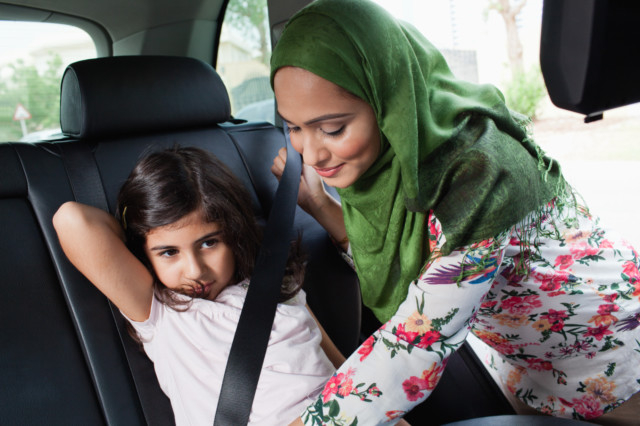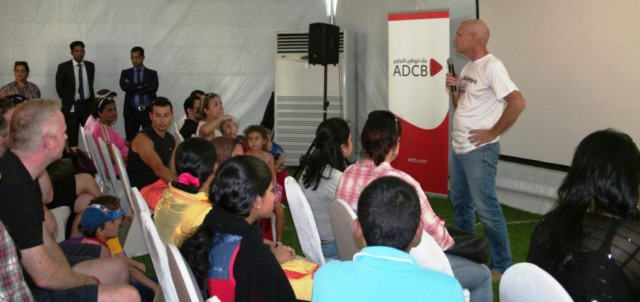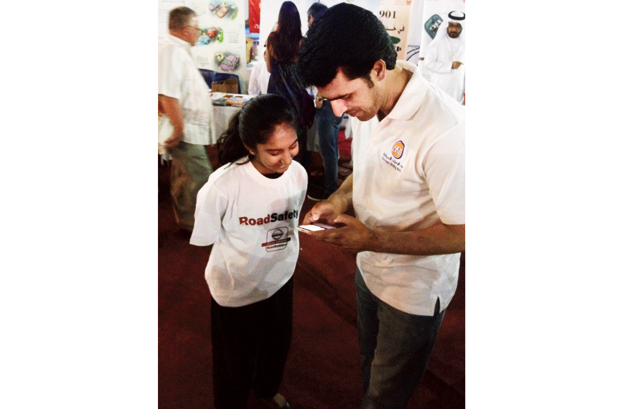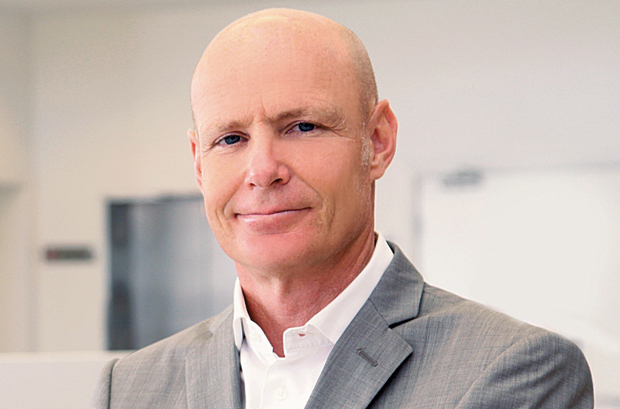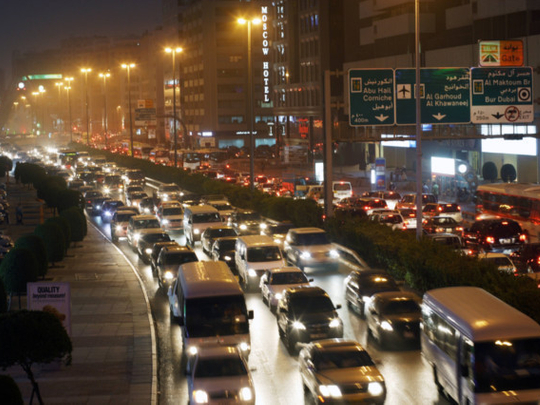
Formula One legend and three-time F1 world champion Niki Lauda knows a thing or two about driving safely. He almost lost his life while participating in the German Grand Prix in 1976 at the 22-km Nürburgring circuit that soars and plunges through the woods of the Eifel mountain range in Germany.
Niki had doubts about this circuit and had complained about safety shortcomings at some areas. He also tried to mobilise other drivers to boycott the race, but failed. He raced anyway, but crashed on the second lap and his Ferrari burst into flames.
Niki sustained severe burns and after he was rescued lapsed into a coma. But that did not stop him from making an astonishing comeback and winning the F1 championship again in 1984. So, when Dubai-based fellow Austrian Thomas Edelmann approached Niki to support his road safety effort, he agreed immediately.
“Safety is a key concern on all roads and my life experience shows how rapidly lives can change through an accident – in a split second,” said Niki. “Safety must be the number-one priority when we are driving on the UAE’s roads.”
Road accidents have been a source of concern to Thomas ever since he relocated to Dubai in 2000.
According to Dubai Police figures, 160 people were killed in road accidents in 2013, up from 123 in 2012. An earlier World Health Organization (WHO) study had said that road accidents were the second major cause of deaths in the UAE and deaths due to accidents have been increasing every year. A new global map prepared by the Pulitzer Centre in the US has revealed that the UAE with 12.7 road deaths per 100,000 population, was far above countries like the UK, which has only 3.7 deaths per 100,000 people. The US is nearer the UAE figure at 11.4 per 100,000.
According to the Health Authority of Abu Dhabi (HAAD), road accidents are also the primary cause of deaths of children in the UAE (63 per cent of childhood deaths are due to accidents), and 90 per cent of children who die in such accidents are unrestrained and many die from injuries suffered during the accident.
In a report released last month, Dubai Police said that the first seven months of this year saw 1,529 road accidents, which resulted in injuries to 1,316 people. Of the injured, 575 were drivers, 535 were passengers, and 206 were pedestrians. Of these, 122 were severely injured, 391 sustained moderate injuries and 796 suffered minor injuries.
Road traffic safety in the UAE had been preying on the mind of the 39-year-old communications and public relations specialist since he moved here from his native Austria, a relatively safe place to drive (6.6 deaths per 100,000). “Our son, Oliver, was five years old then, and we were very afraid for him,” he says.
The level of traffic and the road fatality statistics worried him. “The first car we bought was the biggest SUV that was available in the market then, with the express purpose of protecting our son. Since then, I’ve always wanted to do something to improve road safety, not just for my son but for other road users as well.”
For 12 years Thomas kept worrying about these issues until in 2013 he could no longer keep from acting on them. He decided to launch his own road safety campaign through the website www.roadsafetyuae.com.
There was another reason why road safety was close to his heart. “Transportation was one of the subjects I studied in college, and so I have a pretty good understanding of its intricacies. Also, one of my aunts used to work in a driving school in Vienna so I was well educated about road safety right from my childhood.”
Thomas put together a concept paper about road safety and presented it to the Roads and Transport Authority (RTA) in September last year. “They were thrilled and willing to come on board as a supporter,” he says.
“So, I left the cushy corporate world to pursue my passion and to try to make a difference by applying what I have learned in my career for a very worthwhile cause. Then car manufacturer BMW came on board, as did Michelin – two big corporates that have been campaigning for road safety for many years.”
Slowly, many other organisations lent their support to his campaign by sponsoring the website activities.
Thomas’s website went live early this year. While initially there was the impression that this was just one more initiative, Thomas had other plans. “We are basically an educational platform,” he says. “I realised that there are many campaigns, but none of them are permanent. What was missing was one platform supported by all the entities working together with them on all their different campaigns, and more importantly be there on a permanent basis to give people tips and tricks about staying safe on UAE roads.”
His idea is to help buttress Dubai’s 2020 target of zero traffic deaths per 100,000 people. Thomas began with about 40 topics ranging from speeding to wearing seatbelts, driving in bad weather conditions to jumping lanes, and taking extra care around schools, among others.
“One of the main killers on the roads is improper lane changing,” says Thomas. “Many drivers don’t use indicators or give sufficient warning to other users before changing lanes.
“One of the practical tips we offer is to tell people to start planning your change of lane beforehand and not at the last moment. That gives you time to move into the lane you want to comfortably and without hassling other users. Prepare all your manoeuvres, check all the mirrors and change lanes, one at a time.”
Thomas has held several face-to-face events, such as the RTA and Dubai Police gathering earlier this year at The Walk JBR, where he received support from students to get people to sign their online pledge.
He was also instrumental in arranging an event with Abu Dhabi Commercial Bank (ADCB) in the capital at the Health & Wealth event, where he held workshops for bank customers, educating them about road safety.
Students have been a key part of Thomas’s road safety education scheme, he says. “I was invited to the Michelin Man Academy road safety programme for students of the Deira International School. I presented my programme and got the children engaged in a very interactive way with some of the key issues of road safety concerning them, such as how to conduct themselves around car parks, and also rudimentary driving rules, which will stay with them as they grow up.
“We are currently working with the Knowledge and Human Development Authority (KHDA), Michelin and BMW to expand this programme to as many schools in Dubai as possible.”
Thomas wants to make his road safety website a comprehensive source of information. The website is essentially a practical guide, covering all aspects of driving in the UAE, with a blog for readers where they can offer suggestions for improving road safety, which are debated online and then forwarded to authorities for consideration. What’s unique about the website is that “the users create their own content, depending on their experiences and their requirements. Meaning that all content is open to input and remarks by our users. Users can recommend new topics to be featured on our site.
“We are a permanent platform, and not a campaign,” says Thomas.
Spreading awareness is the only way to change the driving culture in the UAE, feels Thomas. And for that, he’s teaming up with companies to get the word out.
“We are working very closely with several large corporations [Nissan, Audi, Zurich Insurance, Mercedes-Benz, Daman Insurance, Vox Cinemas and Valvoline, among others] who help us spread the word about traffic safety,” he says.
The website seeks to actively involve the public in its initiatives. “We recently launched a pledge that calls for people to sign up for safer driving,” says Thomas. “Those signing up have to commit to four things: Always fasten seatbelts, always use indicators, avoid speeding and never use the mobile phone when driving unless it has a hands-free option.”
The pledge has created waves with more than 1,200 participants taking it, he says. The Indian Ambassador to the UAE, TP Seetharam, gave a boost to Thomas’s efforts by reaching out to Indians, appealing to them to take the pledge.
“Please help them reach the figure of 100,000 before the end of the year by taking the pledge and helping make the roads safer,” he urged.
Thomas plans to start the next awareness campaign soon to boost the numbers and to get more UAE traffic participants to reflect on and to commit to safe conduct on our roads. “We need a culture change on our roads, from driving ‘against each other’ to ‘driving with each other’,” he says. “We need to care for our own safety and for those of our passengers and of all other traffic participants. We need to establish a caring mentality. Individuals, media, corporations, governmental entities, celebrities and all other stakeholders are invited to support us.”
Thomas believes that his work is the ‘soft’ side of enforcing road safety. “There are two ways to get people to practise road safety – the stick and carrot approach,” he says. “The stick approach is to levy penalties and enforce rules. Many people believe that it is not so much imposing more rules, but about enforcing rules that are already in place.
“We want to apply the carrot approach – give people reasons to understand why it is not safe to speed and why it is so important to buckle up in the car. We want them to remember and follow rules for their own safety. It’s an educational platform and for this it needs broad reach and consistency.”
To this end, Road Safety UAE is working with driving schools like the Emirates Driving Institute.
So, what is their mantra? “Nothing very complex,” says Thomas. “It’s very simple: Be generous, polite and display proper etiquette on the road to new road users. Treat others like you want to be treated.”
The website also educates drivers on new rules and amendments that are introduced from time to time. “The trams are coming up, and there are new rules. Learner drivers are being trained on 10 new road signs and seven new markings that will take effect when the Dubai Tram begins operating on November 11.
“The driving schools will teach new drivers, but what about the others? We will teach them. That’s the reason for us to exist,” says Thomas.
Thomas says his life has become richer after dedicating his time to educating people on road safety. “I’ve met many people who are very committed to road safety, and who have a personal passion for the topic,” he says. “Some of these people are students, who organise awareness drives at their schools; some are regular users of our site, posting repeatedly their improvement proposals for road safety; some are working for governmental entities where they can translate their passion into concrete action to the benefit of the society.
“What they all have in common is their passion and they all try to make a difference.”


